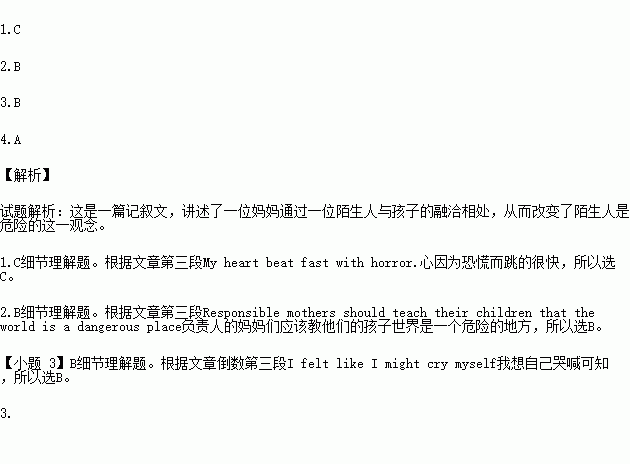题目内容
“We are good mothers,” I said to my friend, as we sat on our comfortable beach chairs under our beach umbrella and watched our children playing in the waves.
Out of nowhere, the children took off running. About fifty yards from us, a man—maybe in his fifties—was fishing. The children stood next to him and watched with their little mouths hanging open as he cast the fishing lines. He smiled at them. They ran back to us—all except my three-year-old daughter, Drew.
My heart beat fast with horror. “Drew! Come here! Play with your friends!” I shouted, very aware that my speeches about not talking to strangers weren’t working. It seemed that many parents heard of horrible stories about children being taken away by strangers. Responsible mothers should teach their children that the world is a dangerous place. So I felt relieved when Drew ran towards me and took hold of a shovel (铲子). Then she looked me in the eye: “I want to be with the person.”
Again, she approached the middle-aged man, and started digging next to him.
Several seconds later, she returned, waving something shiny.
“Look, Mommy! A toy fish!”
It was, indeed, a toy fish—yellow and rubber. This must have been what he was using to attract the fish. And he’d given it to Drew. The three other children were deeply impressed, and they didn’t try to hide how jealous(妒忌的)they were—clearly, they all wanted the fish.
“My friend gave me that fish!” Drew shouted loudly. The sand in front of the umbrella turned into a preschool cage match with a yellow rubber fish flying through the air. I felt like I might cry myself.
Unexpectedly, there he was: the man, standing right next to us with three more rubber fish in hand. He handed them to each of the children. By their faces, you would have thought he was actually the really kind big brother.
“Thank you,” I said, realizing that there is good and kindness in strangers.
1. How did the author feel when Drew stood beside the man?
A. relieved B. angry C. concerned D. calm
2. What does the author think good mothers should do?
A. be around their kids
B. warn their kids of danger
C. teach their kids to behave well
D. devote themselves to helping their kids
3. When was the author at a loss(迷茫)?
A. Drew handed her the toy fish
B. The kids fought for the toy fish
C. The toy fish was covered with sand
D. The stranger appeared from nowhere
4. What would be the best title for the text?
A. Give a kid a fish
B. We are good mothers
C. The world is dangerous
D. Teach kids to be kind



